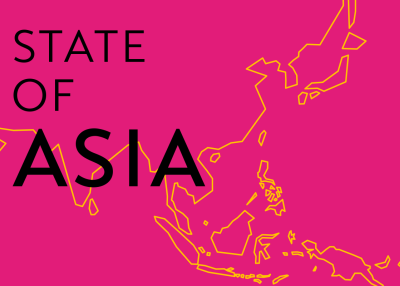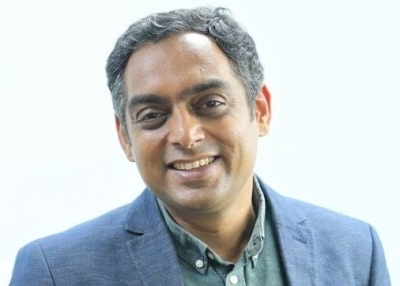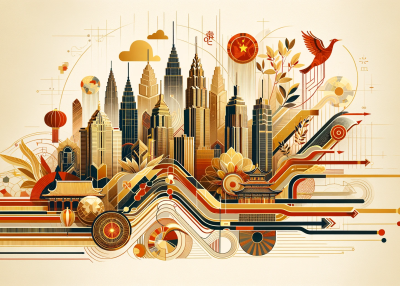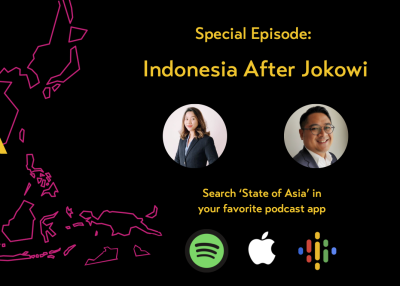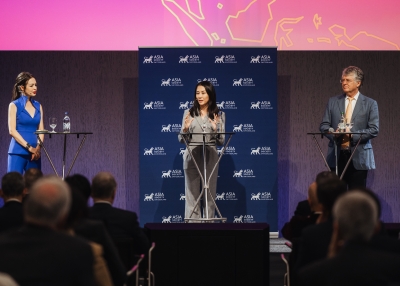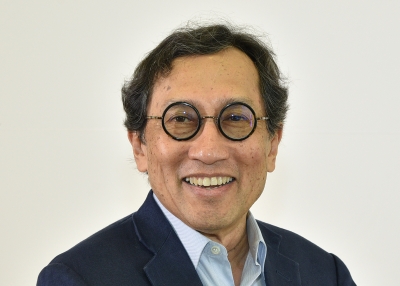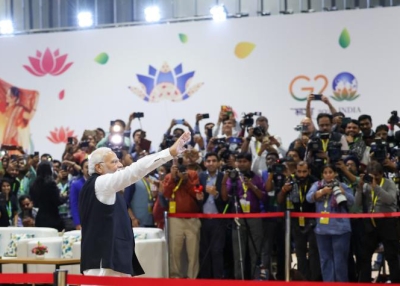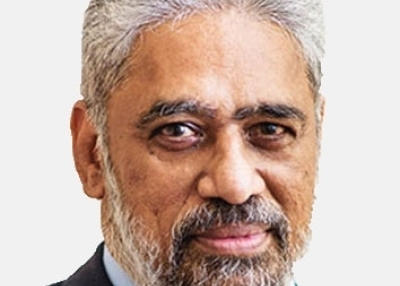State of Asia with Simona Grano
On Taiwan's complicated election, and China's possible reaction
GUEST ON THIS EPISODE

Simona Grano is an associate professor and director of the Taiwan Studies Project at the University of Zurich and a Senior Fellow at Asia Society's Center for China Analysis, where she focuses on Taiwan and its upcoming presidential election.
Simona has held research positions and taught China Studies and Taiwan Studies at Ca' Foscari University of Venice in Italy, at the University of Zurich in Switzerland and at National Cheng'chi University in Taiwan. She is a research fellow of the European Research Center on Contemporary Taiwan (ERCCT), in Tübingen, Germany and a research associate of SOAS, London.
Simona is the author of Environmental Governance in Taiwan: a new generation of activists and stakeholders, published in 2015 by Routledge. Her articles have appeared in the Journal of Civil Society, Journal of Current Chinese Affairs, China Information, Asiatische Studien, Taiwan in Comparative Perspective, Orizzonte Cina. Her latest edited volume: China-US Competition: Impact on Small and Middle Powers' Strategic Choices, was published by Palgrave Macmillan in December 2022.
Simona completed her Ph.D. in Chinese Studies at Ca' Foscari University of Venice, Italy in 2008.
In this episode she gives us a lay of the land ahead of Taiwan's January 2024 presidential election. Instead of the usual 2, this time 4 candidates are on the ballot. How will this split the vote? And how will China react if, for the first time ever, the pro-independence DPP manages to win the presidency for a third time in a row?
Simona Grano will be in Zurich to share her insights at our annual flagship event, the STATE OF ASIA conference on November 22. More information on the program and how to attend is available here.
STATE OF ASIA podcast
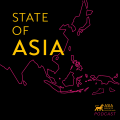
Season 5, Episode 3 – published October 17, 2023.
Host: Nico Luchsinger, Executive Director, Asia Society Switzerland
Editor and Producer: Remko Tanis, Programs and Editorial Manager, Asia Society Switzerland
Find previous and future episodes here, on Spotify, Apple Podcasts, Google Podcasts, or search for 'State of Asia' in any other podcast app. We're also on YouTube.
Transcript
00:00:03 Nico Luchsinger
From Asia society Switzerland, this is state of Asia. In this podcast we are bringing you engaging conversations with leading minds on issues that shave Asia and affect us all. I'm your host, Nico Luchsinger.
00:00:16 Nico Luchsinger
Today I'm speaking to Simona Grano about the upcoming elections in Taiwan. If you have followed our work in the last years, you will know Simona. She has appeared regularly on our program as a moderator of our A closer look series and a participant in two of our Oxford debates. She's currently the only person to have won both Oxford debates that she has participated in.
00:00:40 Nico Luchsinger
As of this September, Simona is also a senior fellow with Asia Society Center for China Analysis, where her work, naturally, is focusing on Taiwan and especially its upcoming elections. In January, she will also speak at our State of Asia Conference on November 22nd here in Zurich. More information about that is in the show notes. Simona is also an associate professor at the University of Zurich with a focus on Chinese and Taiwanese studies.
Simona Grano, welcome to the podcast.
00:01:06 Simona Grano
Thank you for the invitation, Nico.
00:01:07 Nico Luchsinger
Simona, you studied technology in Venice and in Zurich. Were you always specifically interested in Taiwan? Or is this an interest that developed over time? What makes Taiwan an interesting place to study?
00:01:18 Simona Grano
I came to be interested in Taiwan quite late in my academic career. I did all up until my PhD focusing on China only. My PhD was in fact about private property, or lack thereof in China, and then once I moved here to Zurich, I wanted to compare the topic I was studying at the time was environmental governance, and I got interested in comparing how these processes work in three different regimes authoritarian in China, democratic in Taiwan, and never fully democratized in Hong Kong. And that's how I started to study Taiwan. I was there for one year with the SNF stipendium between 2011 and 2012. And that's something that got me really interested actually, in politics, because that was a pre election here. So since that moment onward I started to focus much more, not only on Taiwan, but specifically on the relationship between China and Taiwan.
00:02:11 Nico Luchsinger
There are kind of two opposing narratives on Taiwan, one as a place it seems that most people who visit totally fall in love with because of the people and the nature and the open mindedness and the food. But the other also is Taiwan being as an economist cover famously put it last year, the most dangerous place on Earth as the place that might as well be the cause and starting point of global armed conflict and world war.
00:02:36 Nico Luchsinger
How do you reconcile these two narratives. It seems like they're really at loggerheads with each other.
00:02:41 Simona Grano
No, I don't think they are, Nico. I think you described 2 realities that are actually well living in the same place or being embodied in the same place. I mean, absolutely. Taiwan is a place that has open mindedness. It's progressive. It's one of the freest nations, if you wanna call it a nation, in Asia.
00:02:59 Simona Grano
It is a very progressive place where, for example, things like same sex marriage have been implemented. It is open minded and all of that it's famous for its food. It comes from all over China. That does not necessarily have to be a loggerhead with the fact that it has been described by the media, most recently in the past two to three years, especially as the most dangerous place on Earth because of China's threat.
00:03:20 Simona Grano
Although to this regard, sometimes I think that there is this threat, it is there, it is, maybe not as imminent as many would like us to believe, but it is certainly there.
00:03:29 Simona Grano
And it is growing. It is also true, though, that if you talk to Taiwanese, not everyone is so particularly concerned that many people look back into the history, into the past and tell me actually among my contacts and friends that there have been other periods in which they actually were even more worried than now due to a possible Chinese invasion or a threat coming from China.
00:03:50 Simona Grano
One of those periods was 95/96 when you had the so-called Third Taiwan Strait crisis. It was because the then President Lihui was talking about going to visit his alma mater in the United States, Cornell University, and China interpreted that as Taiwan moving its foreign policy away from the One China policy, but also in 96 you had the first presidential elections.
00:04:13 Simona Grano
Where the people could directly elect a president in Taiwan and that was also a very unwelcome development for China. So I think that the difference between back then and now though, is the fact that even though many people may feel that the threat was more present back then, China has different military capabilities. Now the PLA is different now and while back then, we certainly were sure that the PLA or the Chinese army probably would not have been able to take back Taiwan, or for sure it would not have been.
00:04:43 Simona Grano
By now, of course there's a lot of certainty, even in regards to the competence of the PLA vis-a-vis the US Army, not the Taiwanese army, and in many of these exercises and simulations they have carried out we know that actually, China and the PLA come out as victorious. So I think that's the real difference between back and then. But going back to your question, I think these two realities really do live within the same country, Taiwan.
00:05:05 Nico Luchsinger
I'm gonna get back to something you said at the beginning because you refer to Taiwan as a nation and then kind of immediately sort of said, well, if if we want to call it that and I'm of course aware that there is kind of a political dimension to this and Beijing is unhappy if people refer to Taiwan as a as a country. But I'm curious as to what your assessment is kind of from a purely sort of political perspective.
00:05:24 Nico Luchsinger
Because again, on one hand, we have a Taiwanese identity that clearly looks nation like and country like. It's a place with its own political system and it's running elections that we're about to talk about.
00:05:36 Nico Luchsinger
At the same time, it is not actually recognized as a country by a vast, vast majority of countries on this planet. So again, how can we have to reconcile these two pieces of Taiwanese identity and and how is Taiwan sort of dealing with these two facets of both sort of relative political independence while at the same time not receiving the recognition of that political independence, at least not formally around the world.
00:05:59 Simona Grano
Taiwan, of course, is a fascinating case precisely because of this, I mean, if you look at certain characteristics that do define what is a state actually Taiwan fix them all. And according to this it should be called a state. I mean it has its own borders. It has its own army it has its own currency, its own banking and postal system. It has its own fixed population
.
00:06:23 Simona Grano
Which has even been growing, and all of that right. But of course other political reasons and mostly out, I would say, of deference towards China, the PRC, and indirectly resulting out of a Cold War logic, we know that as you said before during the question, Taiwan by most of the countries in the world is actually not recognized as a state. That does not mean that these countries don't have any ties, but they don't have any diplomatic ties to Taiwan because in virtue of the one China policy, they can only recognize one China in the world, it's either the ROC on Taiwan or the PRC.
00:07:03 Simona Grano
But my personal take on this is that Taiwan has come to this out of the twists and turns of history, things could have gone differently in. In fact, in 72 when the talk was starting at about in 71. Of course, China sort of substituted the PRC, substituted the ROC in the seat to the permanent seat at the United Nations and one year later around that time a sort of dual recognition possibility was raised by some states. The fact that there could have been, you know, either two China or the one China one, Taiwan.
00:07:31 Simona Grano
But that was completely refused by Chang Kai-check because he could not let go of his ideologically prone position that he was the real China. And one day he would go back to conquer the mainland territory. And so I do believe that the situation we are now living through is really nothing more than the irony and the result of the twists and turns of history and the fact that China has by now become so almighty both in political and economic terms that it can sort of dictate its own rules and its own rules want to convey to the rest of the world its own narrative. Ergo, Taiwan belongs to us, to to China.
00:08:05 Nico Luchsinger
Maybe continuing in the vein of this that are related to Taiwan that have this strange duality that we've been discussing sort of built in. I feel it's also very present in Cross Strait relations between mainland China and Taiwan, and I've always found it really hard to kind of like wrap my head around that at the same time, these relationships are icy aggressive. China is continuously increasing military maneuvers around the island.
00:08:31 Nico Luchsinger
But at the same time, there's also a deep connection. There's a cultural connection, but there's also an economic connection. Mainland China imports a lot of semiconductors and other things from Taiwan for a long time, there have been many tourists from mainland China to Taiwan. I think that slowed down a little bit, but still, there is a connection between the two places. They're they're by no means kind of like, separated.
00:08:50 Nico Luchsinger
How would you assess the relationship at its current moment in a historical context? In which direction broadly do you think you're moving?
00:08:57 Simona Grano
I think that we should also keep in mind that we need to revisit the question in a few months. Much of how the relationship will evolve also depends on who will be the winning party in Taiwan, but currently taking into consideration the last eight years of the DPP Presidency, I would say that we have entered directly from a phase of rapprochement. I mean you had quite close ties between China and Taiwan, when Ma Ying-jeo was in the Presidency, so before time went from 2008 until 2016, but after that and and during that time, of course, things and ethical changes between China and Taiwan took place prior to Ma Ying-jeo. You did not even have any direct links in terms, for example, postal communications, shipping lanes, direct flights. He instituted all of that and what you mentioned before the exchanges between students, between tourists really took up exponentially during that period. In a historical context. That's very interesting because I think that was the time in which China thought that finally, the hard fruits of its
00:10:01 Simona Grano
previous attempts to sort of like tie Taiwan through economic ties were finally paying off. That was finally at the right moment, but then, suddenly, a president from the other camp, the camp that still has a pro Independence clause, won the elections. And for China, that was a shock, because of course it understood.
00:10:22 Simona Grano
In the first four years, of course, it hoped that it wouldn't be, you know, winning the Presidency again in 2020. But then what happened in 2019-2020 was, of course, that China became much more aggressive toward Hong Kong and Taiwanese were watching that very well, and that gave a boost to Tsai Ing-wen. So I would say that we are now in a situation that is very interesting because China really does not want the DPP to win again, because this would also be the first time since Taiwanese people can vote directly for the President that you would have a third term by the same party that has never happened, and I think in China's minds, if that would happen for the CCP, this would sort of consolidate the trend that Taiwanese are gradually actually detaching themselves from China.
00:11:07 Nico Luchsinger
Let's talk about the upcoming elections. They're on January 13, Taiwan is electing a new president, the incumbent Tsai Ing-wen is not running anymore. Let's talk about Tsai Ing-wen's legacy she's been in office for eight years. What has changed on the island during her tenure and how is her presidency assessed in Taiwan itself?
00:11:24 Simona Grano
Well, so I think there are 2 phases to this legacy to these eight years, I mean Tsai Ing-wen has a style and her own personality are really quite demure. She is stable. She is predictable. These are not bad qualities, by the way. If you look at the international sphere and many leaders that are completely unpredictable, she because of this.
00:11:44 Simona Grano
Also I think this has earned her a lot of trust around the world, her predictability. For example, her good management of the COVID-19 pandemic, all of that, I think, also helped to sort of bestow on Taiwan a certain moral high ground, right? For example, as I said, managing the pandemic, but also in moving away from the etiquette of being a troublemaker, that Taiwan had under the previous DPP President Cheng Tribune, right. I think that has really done a lot of wonder for Taiwan because it has won respect for it internationally.
00:12:16 Simona Grano
She is, in fact, one of the most preferred Presidents of Taiwan in the United States and following her footsteps, I believe, will be very difficult. And yet that's what each hopeful presidential candidate is doing because they all have to go to the US in something that it's called informally the interview. However, her legacy is not just positive and she has not been an innovative leader
00:12:41 Simona Grano
She has failed to solve many problems that actually plague Taiwan have plagued it eight years, for instance, Taiwanese society has a stagnant wages. It has a sluggish economy, it has a growing shortage of affordable housing for younger generations. It has immigration issues. It has energy security and problems with defence policy. And the China threat among many more. And I think that these issues are actually bringing some sort of uncertainty to the presidential race because they are also among the reasons that explain why the DPP suffered a very serious defeat in the local elections of November 2018 leading her to actually tend resignation as a party leader and also two years ago it was sort of the same 2018. She was then aided by the Hong Kong quashing of civil liberties. But two years ago it was the same thing that people actually voted for the Kuomintang in the midterm elections. And and I think that the frustration that the population is actually seeing in this regard is actually sort of associated also with William Lai, the current presidential candidate for the DPP.
00:13:41 Simona Grano
Because he has been the vice president for the past four years, and I think that people think if he has been unable to solve these issues as Vice president, why would that change if he becomes president, right. And so that leads me to believe that if the DPP wins the Presidency in January, it will be probably by a smaller margin than in the past. Also thanks to the fact that will be split, but it could be possible that William Lai and the DPP will lose the parliamentary majority and that would make it that very difficult to then rule of the country.
00:14:12 Nico Luchsinger
All right, so we've already kind of gone into looking a little bit at the field. You mentioned William Lai, who's the current vice president, is running to succeed Tsai Ing-wen as the candidate for the DPP, which is the the party that is currently in power. There are three other people who have declared their intent to stand in this election.
00:14:29 Nico Luchsinger
Can you quickly run us through those remaining three people who are running against William Lai.
00:14:34 Simona Grano
The situation at the moment is quite complicated and no one really has a clear majority or enjoys a clear popular support. The last thing I wanna say about William Lai is that even though he comes from the same party as side, he's actually very different from her in his heart, he's actually a core pro independent person.
00:14:50 Simona Grano
But he will never be able to express that by now, because of course, he's also aware of the fact that, you know, if you need us support, you have to be moderate and follow in the footsteps. The other people that are running well for the Kuomintang we have Hou Yu-ih. So Hou is actually a quite peculiar or rather bizarre figure for the warming down because he's a native Taiwanese, which is a bit more rare in that party.
00:15:13 Simona Grano
He's actually quite moderate as well. He never really holds the party line. He's not deep blue pro unification. However, what I have to say is that precisely this attitude he has so far shown has won him support from one side of the electorate, but has also cost him support from the more deep blue end of the party, the people that are more prone to wanting to really achieve unification with China, toeing the party line, and so he has had to adjust his policy and also clarify his stance.
00:15:46 Simona Grano
And he has brought himself closer to more radical positions of unification with China, and in doing so, he actually lost the support of those initial candidate or voters who supported him in the polls because they thought that he could reform the Kuomintang from within. Then this year, you also have a wild card. This is the third political force.
00:16:06 Simona Grano
Ko Wen-je. I mean, he is actually also a former mayor of Taipei City, initially elected with the help of the DPP in 2014, he established in 2019 the Taiwan People's Party, which then became the island's third biggest political party after the DPP and the Kuomintang during the 2020 legislative elections, and he's also a doctor like William Lai. And I think that he's trying to create for himself the image of a party that has a new approach to politics and resonance. Well, with part of the population in Taiwan that are really deeply dissatisfied
00:16:44 Simona Grano
with the two traditional mainstream parties among them, of course, many young people, and of course, he tries to leverage this distance but has a little bit of a similar problems as the candidate of the Kuomintang his lack of an ideology of an ideological standing, and he's often deliberately vague. Political statements actually have caused him a lot of criticism, especially when it comes to addressing the cross trade issue. And then we got the last entry that joined the race also quite late. This is Terry Guo.
00:17:17 Simona Grano
Of Foxconn. He’s Taiwan’s tech tycoon. He revealed his candidacy quite late running as an independent for Taiwan's presidential race only in August because and this move was also considered to be a betrayal of the Kuomintang, and there are good reasons for this because he actually tried to be nominated by the Nationalist Party by the Kuomintang first in 2019.
00:17:39 Simona Grano
And he lost in the primary elections. But then this year, the party actually handpicked Ho Yu-ih and left Terry Guo again to the side. And while Terry Guo initially said that he wanted to support the choice by Eric Chu and support the presidential candidate of the Kuomintang,
coming down shortly after he revealed actually his own candidacy right. For the moment, he's not faring very well, he has positions that are very similar to the Kuomintang position to a certain extent more radical than Hou Yu-ih, and he's trying to win more votes by having chosen basically second in command, his running mate, who is an actress of a rather famous Netflix series, Wavemakers and that many people are speculating he's doing that to attract younger voters support.
00:18:23 Nico Luchsinger
It's getting a little bit complicated in Taiwan, which historically is a system that consists of two political parties now we have 4 candidates which come from three different parties. So you said at the beginning there is a chance and and that seems you know kind of like the likeliest outcome is that the DPP and William Lai will win giving the DPP a third presidential term, albeit maybe with a smaller majority and crucially without the parliamentary majority. So we assume, you know that's one scenario. Is there another scenario that you think is realistic?
00:18:54 Simona Grano
Well, first of all, I think a lot of what will happen from here to January will also depend on how China acts. But clearly from the previous discussions that we have had regards to Hong Kong it is very likely that if China acts in a way that is deemed as threatening by the Taiwanese population, it is very likely that this will push Taiwanese to vote for the DPP again, as actually took place in the past and that's why I think China has learned from past mistakes and is probably using now different tactics.
00:19:27 Simona Grano
And it's not trying to intimidate the electorate because in all of the cases which it has done, so this has backfired and people have voted against Beijing's wishes. So to go back to your question, we still have to wait and see what will happen to know.
00:19:39 Simona Grano
What kind? What kind of other possibilities are out there? But you mentioned what we said before. He might win William Lai with a majority, but with a small majority. But it could also be possible that actually it does not get the majority and still wins. Why do I say that? Because, of course. The problem in this election is that the opposition vote is split. All the people that would vote for Hou Yu-ih, for Terry Guo, they are blue. So this split vote actually damages the Blue Party, the Kuomintang and not the DPP. So the possibility is also that William Lai would get 40% or less. Then even a little bit less than that there.
00:20:19 Simona Grano
But the rest of the 60 something percent is divided among three other candidates, so that anyway, the majority is for William Lai. This is also a likely scenario, but as I said, for that, I think we still need to see also to really look into that in depth on the percentages how China will behave from here to January.
00:20:39 Nico Luchsinger
What's your assessment of where the votes are? Ko Wen-je, so he's the the third party candidate is running for the TPP, not the DPP, the Taiwan people party, is he gonna siphon off votes more from the DPP camp or for the gunman camp? Or is it unclear where his support will come from?
00:20:57 Simona Grano
I think for the moment it's a bit unclear. I mean, the poll say that William Lai, the DPP candidate is currently leading actually in the polls that they're carrying out with more than 30% approval rate. And in second place you have actually Ko Wen-je. Even so I think that even if the TPP becomes a credible alternative or even surpasses the Kuomintang, I still think that most young people or some of the young people there, that's the cohort where the TPP and Ko Wen-je may actually draw votes because there are a lot of young people that are really tired about this, more traditional orientation that their parents and grandparents have mostly out of loyalties.
00:21:38 Simona Grano
And the fact that they lived through the early years and the struggle of the country. So people from an older generation are traditionally more tied to this kind of division. But the younger generations are very often tired of hearing these two political debates, which they think are ossified.
00:21:54 Simona Grano
But also I think there's more of an issue of people are often, especially if they're younger, more interested in daily life, concerns that actually interest them first hand, and that not just the more spotlight issue of cross strait relation, but really how to rule the country on a daily basis, right? How to solve the issues that we talked about before that are hampering for example young people from creating a family in Taiwan and of course in this scenario, the TPP has a good chance in trying to insert itself presenting itself as a credible alternative, preoccupied with more daily concerns.
00:22:29 Simona Grano
However, as I said, he has been erratic, Ko Wen-je, many, many times in his statements regarding China, and there are also many people that say that choosing a leader that has no experience to lead Taiwan in such crucial times would be a mistake. So he also has had to clarify certain stances. He's not always, particularly professionally, as he appears in media.
00:22:51 Simona Grano
And I think that could become a problem as we go forward. And again here I would again bring in the China issue because that's a really important factor to sway also how people could take their decisions.
00:23:04 Nico Luchsinger
So the Kuomintang, they have framed the selection as one between war and peace, which means they're suggesting that the continuation of DPP rule would increase the danger of conflict with mainland China. But given your point that there's a little bit of a convergence to the middle in the fields of presidential candidates because neither pro independence nor pro unification standpoints have a majority in Taiwanese society. Does it really matter who will govern Taiwan as of 2024, will that have a significant impact on cross strait relations or will they all pursue more or less the same policy of maintaining the status quo?
00:23:39 Simona Grano
It does make a huge difference, I would say who will win the elections because of how China will react towards the parties. So I do believe that the difference is that China is much more likely to cooperate with a Kuomintang government.
00:23:51 Simona Grano
And that is why we already seen our attempts by China to sort of try to push plans, for example, for a future economic zone that would integrate economically, Fujian in China and, of course, ROC Republic of China controlled islands, outer islands of Jinmen and Mazu, hoping to entice the Taiwanese by raising, of course, the advantages of cooperation with China.
00:24:13 Simona Grano
And of course, in not openly stating that if you vote for a China friendly party, this is of course much more likely to happen and tensions will subside and will go back to the rosy time of cooperation as it was during the Ma Ying-jeo era, on the other hand, I think that if the DPP will win again, this will be very problematic for China.
00:24:34 Simona Grano
Because this will mean that the trend of voting for the Pro Independence Party is, even if it's a moderate version of itself, is actually solidifying. And on top of that, I think we will be likely to see a continuation of further attempts by the PRC to isolate Taiwan diplomatically and economically at the international level. China will continue to do what it has been doing for the past few years, putting pressure on companies on foreign governments on parliamentary delegations and international organizations to keep ties with Taiwan at a bare minimum.
00:25:08 Nico Luchsinger
The American China scholar Chute Blanchett, writing in Foreign Affairs a few months ago, called for the US to pursue a policy of deterrence without provocation towards China with regards to Taiwan, because it seems from a standpoint of U.S. policy and maybe Western policy, deterring mainland China to pursue military action towards Taiwan without doing anything to provoke said action is kind of the right thing to do, but it also seems to me that it's like fiendishly hard to achieve right? Do you have a sense of how US or European policy could look like that would achieve the currents but would not run the risk of provocation?
00:25:45 Simona Grano
There is a shift to emphasizing the non military dimension of a possible Taiwan conflict, given of course both the potential global economic cost that would derive out of conflict, but also of a blockade, and of course the key deterrent role that these potential cost play in shaping calculations From Beijing, right.
00:26:04 Simona Grano
So I think that the focus, for example that we are now seeing more and more is the discussion about sanctions, especially prominent after the Russian invasion of Ukraine, economic sanctions, which of course signal that policymakers in the US or in Europe understand that meaningful and efficacious deterrence actually requires really signaling to the Chinese that any attack on the island of Taiwan will result into significant military, but also economic costs. And of course, we know there are limitations. We see this with Russia to what sanctions can achieve, and in this case in deterring China. But I do believe that if we have a large coalition of advanced economies who can credibly signal that they are willing to impose sanctions on Beijing and possibly even to isolate diplomatically if it attacks Taiwan. This could at least help to clarify in the mind of Chinese leadership how damaging for China itself and for the CCP hegemonic position in China, an attack on Taiwan could be for China's interest, and of course, for its future development.
00:27:07 Nico Luchsinger
Simona, thank you very much for joining us.
00:27:09 Simona Grano
Thank you.

